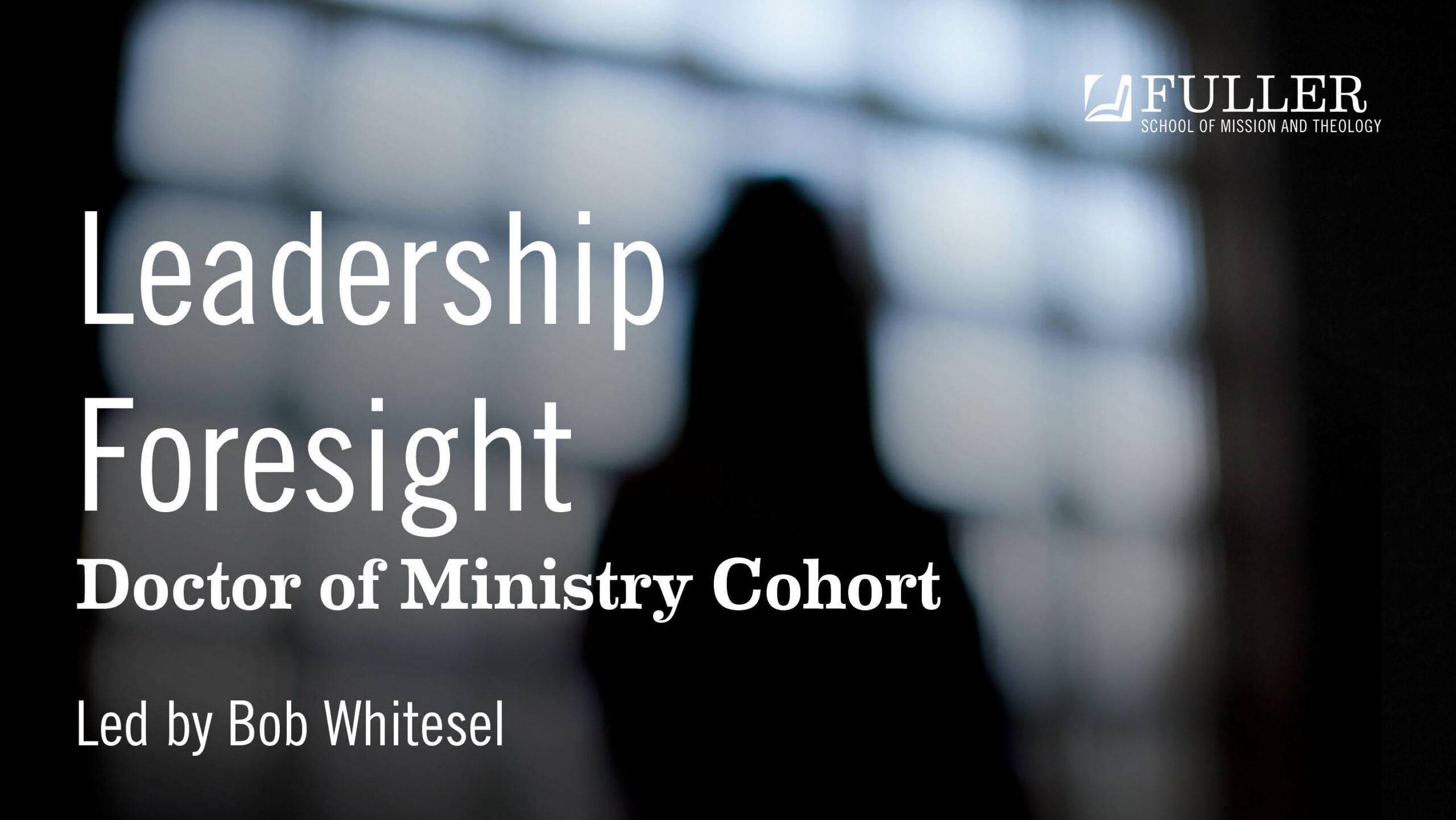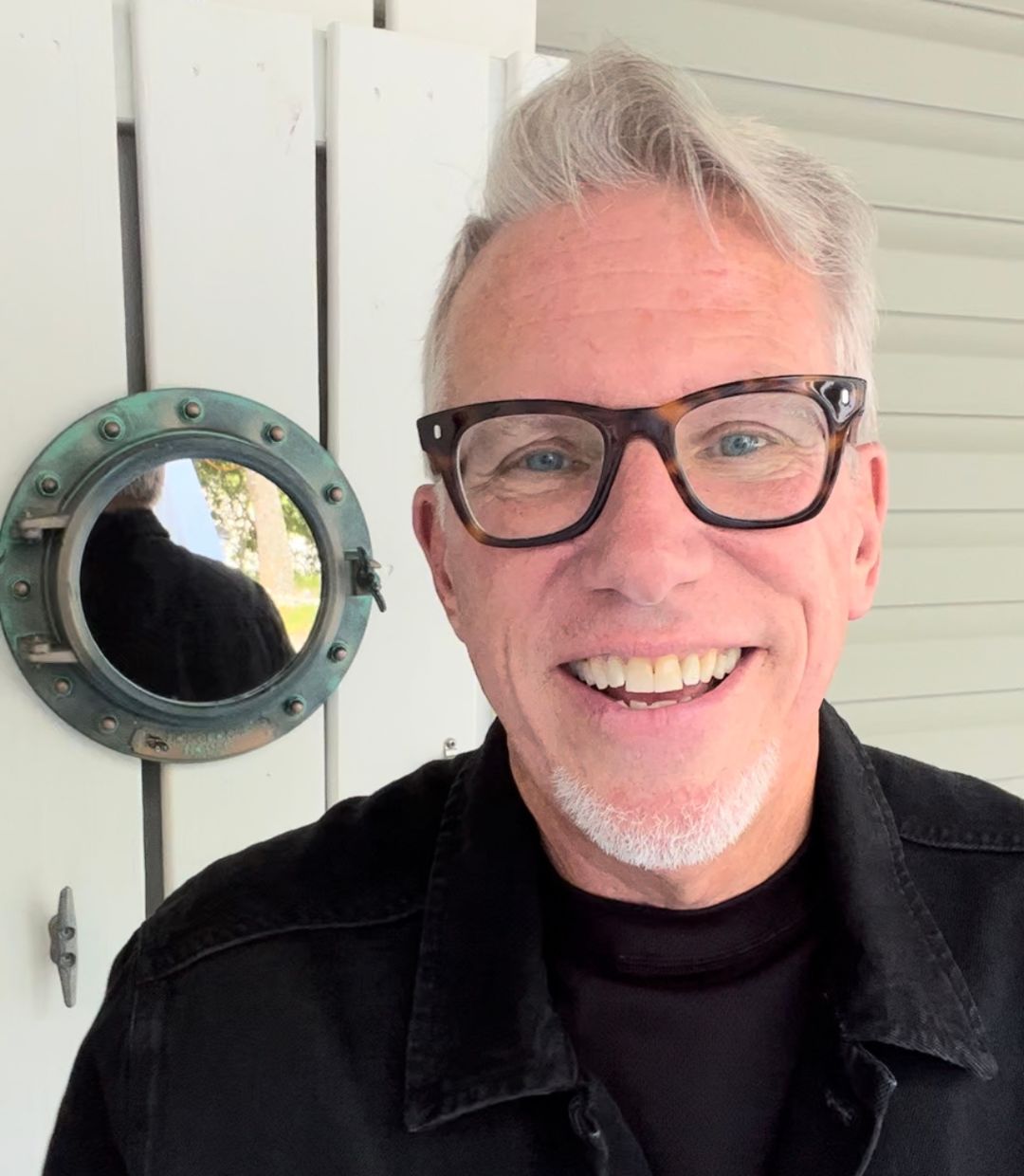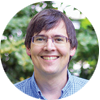
LEADERSHIP FORESIGHT COHORT
Equipped for today. Ready for what’s next.
Summer Application Deadline: May 8, 2027
Decisions Sent: May 22, 2027
Overview
In the Leadership Foresight Cohort, students will cultivate the ability to anticipate cultural and societal shifts and design theologically grounded ministry innovations that promote spiritual and social transformation in times of change.
This cohort equips pastors and ministry leaders with key competencies in foresight, cultural reconciliation, theological orthodoxy, and practical, transformational ministry. Areas of exploration will move beyond attractional models to consider, among other movements, emerging expressions of the church, micro-communities, and multicultural mutuality.
Guest speakers—thought leaders and ministry practitioners from Los Angeles and the Santa Cruz/Silicon Valley region—will guide students in developing biblical discernment, theological integrity, and deeper engagement in the missio Dei.

DMin Outcomes
By the end of the program, participants will be able to:
- Discern emerging cultural and societal shifts and respond by crafting theologically grounded ministry innovations.
- Evaluate ministry effectiveness through the lens of theology, cultural relevance, and transformational practice.
- Critically assess new models of church and ministry, including shifts such as:
- from attracting to sending
- from inward-focused to outward-oriented vision
- from large-scale to communal expressions
- from isolated leadership to collaborative networks
- from monocultural to multicultural community
- from church growth to transformational growth—impacting lives, neighborhoods, and systems
- from organizational power to spiritual empowerment
- Design a forward-thinking ecclesial roadmap that integrates foresight, theological faithfulness, and actionable ministry practices to more fully participate in the missio Dei.
Schedule
Year One: Meeting Future Needs with the Missio Dei: Foresight and Culture (16 units)
Summer 2027: Reading (June-Sep); In-Person Seminar (July 19-23, 2027, 6 units)
Fall 2027: Research Module (Sep - Dec, 4 units)
Winter 2028: Writing Module (Jan - Mar, 6 units)
In Year One, students will be equipped with the theological frameworks, principles, and tools for cultural exegesis and strategic forecasting. In collaboration with Fuller’s Brehm Center, students will engage with guest speakers—including leading thinkers and futurists from Southern California’s communication and creative industries.
The course will explore how cultural analysis, biblical theology, and an understanding of societal needs can enable leaders to anticipate change rather than simply respond to it. Students will learn to adapt vision and ministry methodology with faithfulness to theological orthodoxy while advancing multicultural reconciliation and contextual innovation. This foundation will empower leaders to guide their communities into deeper participation in the missio Dei.
Additionally, students will begin building core research competencies, including theological inquiry and academic writing. With support from Fuller’s library and research faculty, students will complete Part One of their doctoral proposal by identifying key voices and resources in their chosen area of study.
Learning Outcomes
By the end of Year One, students will:
-
Strengthen their ability to analyze historical, contemporary, and emerging cultural dynamics.
-
Develop foresight skills to anticipate societal and spiritual needs.
-
Learn to implement transformational practices that align theological integrity with visionary adaptability—fostering healing, reconciliation, and innovation in ecclesial contexts.
Year Two: Planning Your Future in Advance: Foresight and Strategy
(16 Units)
SM 2028: Reading (June-Sep); In-Person Seminar (July 17-21, 2028, 6 units)
FL 2028: Writing Module (Sep - Dec, 4 units)
WN 2029: Writing Module (Jan - Mar, 6 units)
Year Two focuses on developing strategic goals, methodologies, and evaluation frameworks that enhance an ecclesial organization’s capacity to meet emerging societal and spiritual needs. In collaboration with Vintage Faith Church (Santa Cruz, CA) and thought leaders from the Silicon Valley tech sector, students will explore the growing influence of technology through biblical, spiritual, and multicultural perspectives.
Key topics will include artificial intelligence, virtual and augmented realities, evolving expressions of church, hyper-connected communication, microcommunities, social inequality, and the depersonalizing effects of digital engagement.
Students will examine how the Church can respond to these shifts—not by abandoning tradition, but by reimagining relevance. This includes exploring non-attractional models, nurturing multicultural mutuality, addressing systemic disparities, fostering deep reconciliation, and envisioning the Church’s presence in virtual and hybrid spaces.
In parallel with the cohort learning, students will continue to develop their doctoral research. Focus areas include academic writing, human subjects research (HSR) preparation and certification, and completing Part Two of the doctoral proposal—detailing project implementation and assessment, which will be executed in Year Three.
Learning Outcomes
By the end of Year Two, students will:
-
Design and evaluate strategies that help ecclesial organizations anticipate and respond to future societal and spiritual challenges.
-
Integrate foresight and practical planning into actionable, measurable initiatives that strengthen their ministry’s participation in the missio Dei.
Year Three
The Immutability of God and the Elasticity of Methodology: Foresight and Theology (16 Units)
SM 2029: Reading (Jun-Sep); In-Person Seminar (July 16-20, 2029, 6 units)
FL 2029: Writing Module (Sep - Dec, 6 units)
WN 2030: Writing Module (Jan - Mar, 4 units)
Year Three equips students to anticipate cultural and societal change and evaluate it through the lens of orthodox theology. The course explores the dynamic relationship between future trends and historic Christian belief, helping students discern where they align, diverge, or require careful theological reflection.
Students will also assess the theological, ethnic, and historical frameworks of the denomination or ministry network they serve, and develop a theology of ministry rooted in the immutability of God’s character, will, and nature. This process is designed to strengthen each student’s theological foundation while preparing them to face emerging challenges with clarity and faithfulness.
Guest theologians from Fuller Seminary will enrich the learning experience, offering perspectives on leading with foresight, cultural reconciliation, biblical fidelity, and transformational practice.
In tandem with coursework, students will finalize their doctoral project by writing the introduction and conclusion and revising previously submitted chapters.
Learning Outcomes
By the end of Year Three, students will:
-
Evaluate and refine their theological and ministry frameworks through rigorous, theologically informed inquiry.
-
Assess the theological, ethnic, and historical perspectives of their ecclesial context to lead with deeper understanding and intentionality.

Instructor
Bob Whitesel (DMin, PhD) is a speaker, award-winning writer, and leadership coach on organic outreach, church management, and church growth, and has been called “the key spokesperson on change theory in the church today.” He is founding professor of Wesley Seminary at Indiana Wesleyan University, where he served as professor of Christian ministry and missional leadership until his retirement in 2018. He earned his DMin and PhD from Fuller Seminary and was the recipient of the prestigious Donald McGavran Award for Outstanding Leadership in Church Growth in 2007. Dr. Whitesel is the former president of both the Great Commission Research Network and the Academy for Evangelism in Theological Education and was one of the inaugural fellows of the Billy Graham Center for Evangelism at Wheaton College.
His 14 books include: Preparing for Change Reaction: How to Introduce Change In Your Church (2008), co-winner of the 2008 Resource of the Year in Leadership by Outreach Magazine, and Inside the Organic Church: Learning from 12 Emerging Congregations (2006). Two additional books, Waypoint: Navigating Your Spiritual Journey (2010) and Spiritual Waypoints: Helping Others Navigate the Journey (2010), include personal interviews Whitesel conducted with national leaders on their spiritual transformation, including Tony Campolo, Shane Claiborne, Dan Kimball, Sally Morgenthaler, and Len Sweet.
His book ORGANIX: Signs of Leadership in a Changing Church (2011) was called by Scott Thumma of Hartford Institute for Religion Research, “a wake-up call and transformational challenge for all those clergy still embracing a ‘modern’ approach to congregational leadership. Whitesel offers an insightful and well-researched recipe for the cultivation of authentic, organic leadership for this new reality.” His most recent book is Growing the Post-Pandemic Church (2021).
When not teaching or writing, he is researching the leadership secrets of John Wesley at libraries across England. Whitesel is at the forefront of understanding how Wesley’s leadership method can grow and revitalize churches today.
Bob Whitesel has been married to his college sweetheart since 1974 and together they are the parents of four daughters. Never one to be inactive, Whitesel is a professional ski instructor, a sailing enthusiast, and an avid surfer.
Learn More and Connect with an Admissions Counselor
Chat with an Admissions representative
Office Hours
Monday – Friday
8 am – 5 pm (Pacific Time)
To view in-person welcome center hours for Pasadena, Arizona and Houston, click here.

